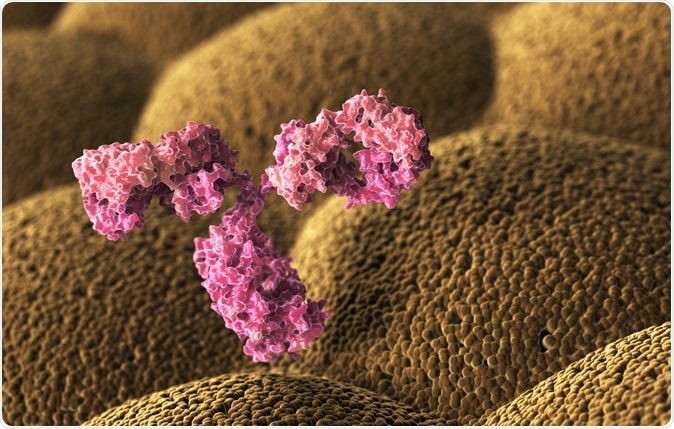One of the important cells involved in the immune response is the T follicular helper (Tfh) cell. These are important in the normal process of antibody production following immunization, for instance. However, they are also abnormally increased in number in patients with autoimmune disease, such as systemic lupus erythematosus. For this reason, scientists have been looking at ways to target these cells as a means of treating such diseases. However, no selective anti-Tfh cell therapy has been found so far. Now a new study suggests a way to block this pathway and potentially treat such conditions.
The role played by immunity in the body is vital to our continued existence as healthy organisms in a world rife with microbes and foreign antigens. However, the immune response must be carefully modulated to prevent its turning against the host organism itself, in the phenomenon called autoimmunity. The normal immune response comprises two components, the constant watch against infection and tumors in the body’s tissues, with a readiness to actively combat any intruders as soon as they are detected. Both cells and their secreted chemicals are important to the correct functioning of this system. The cells comprise T cells which directly attack cellular targets, and B cells which produce a flood of antibodies to help the immune response.

Human antibody (immunoglobulin). 3D illustration Image Credit: Tatiana Shepeleva / Shutterstock
Tfh cells, IL-2 and IL-6
Tfh cells are activated when they bind antigens that are presented by special dendritic immune cells, outside B cell follicles. These follicles, or ordered groups, are found in lymph nodes and the spleen. The activated cells migrate into the follicles, and interact with the B cells to create what is termed a germinal center, where B cells rapidly undergo a process called transformation. This converts them into plasma cells, which are essentially cellular factories churning out specific antibodies in high gear.
The conversion of a peripheral Tfh cell into a germinal center-Tfh cell is followed by an uninterrupted stream of signals from T cell receptors to maintain this state. On the other hand, as a result of these signals, more of a molecule called IL-2 is also produced, while the steady T cell stimulation typically increases the number of IL-2 receptors as well. This should create an inhibitory feedback, preventing further activation of Tfh cells. However, this obviously doesn’t happen.
Now a new study shows that Tfh cell development is affected by another cytokine called IL-6 as well. Previous research by the same team found that when recombinant IL-2 was injected into mice, it prevented normal Tfh responses. In the new study, they injected IL-6 as well, and found that it interrupted the negative feedback of IL-2 on Tfh cells. In other words, these cells continue to respond to the T cell signals but not to IL-2, thus remaining active.
To prove this, the researchers showed that when IL-6 blockers were injected, the Tfh cells dropped in number even at low levels of IL-2. They showed experimentally, that in the first week following an immune challenge, IL-6-induced blockade of the IL-2-mediated inhibition is unnecessary because the IL-2 present in the system is used up by other immune cells called T regulatory cells, or Treg cells. However, once the Tfh cells initiate the germinal centers in the B cell follicles, IL-2 release by the Tfh builds up, to a level sufficient to produce Tfh cell inhibition.
How IL-6 works
They also found how this protection works. Using a mouse influenza model, they discovered that IL-6 blocks the Il2rb gene from interacting with another molecule which triggers transcription, called STATS. This association is responsible for producing the CD122 subunit of IL-2, or its beta receptor subunit. Thus IL-2 produced by the germinal center-Tfh cells no longer acts on these cells because they lack the necessary receptor. This is essential to maintain the late phase of immunity in chronic viral infection. IL-6 also reduces the expression of the CD25 molecule on Treg cells, which is normally increased by T cell receptor stimulation.
In short, the IL-2/IL-6 association is a modulatory mechanism to determine whether the germinal-center-Tfh cells continue to be produced or not, rather than just turning Tfh production of IL-2 on and off. This also explains how some earlier studies brought out apparently contradictory results as to how IL-6 regulated Tfh cells.
The importance of this study
This will help formulate new therapies. For instance, blocking IL-6 selectively by specific antibodies while also administering recombinant IL-2 could be a synergistic mechanism whereby Tfh cells activity is shut down in autoimmune disease. This would prevent the production of autoimmune antibodies. The US Food and Drug Administration (FDA) has already approved both anti-IL-6-antibodies and recombinant IL-2.
Researcher S. Louis Bridges says, “Both IL-6 and IL-2 are key molecules in immune responses and autoimmune diseases. The novel findings in this paper may ultimately lead to better ways to treat diseases such as lupus.” Though this study is in the preclinical stage, this could help to guide future therapies for autoimmune conditions.
The research is published in the journal Science Immunology.
Journal reference:
Inhibition of IL-2 responsiveness by IL-6 is required for the generation of GC-TFH cells. Amber Papillion, Michael D. Powell, Danielle A. Chisolm, Holly Bachus, Michael J. Fuller, Amy S. Weinmann, Alejandro Villarino, John J. O’Shea, Beatriz León, Kenneth J. Oestreich and André Ballesteros-Tato. Science Immunology 13 Sep 2019: Vol. 4, Issue 39, eaaw7636. DOI: 10.1126/sciimmunol.aaw7636. https://immunology.sciencemag.org/content/4/39/eaaw7636